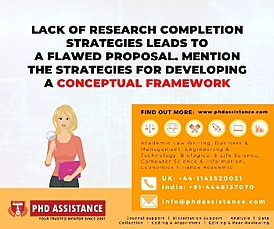Lack of Research Completion Strategies leads to a flawed proposal. Mention the strategies for developing a conceptual framework.
Brief:
- The Conceptual Framework is approached based on a literature review of existing studies on the topic selected for research.
- Conceptual frameworks are particularly useful as organizing devices in empirical research.
- Developing a Conceptual Framework in PhD Dissertation provides an overview of how you plan to research your research goals. Still, it goes further by positioning your work within the broader field of research.

The conceptual framework portrays what you expect to find through your research. It defines the relevant variable for the study and maps out how they relate to each other. The theoretical framework leads to a conceptual framework, which is a specific exploration of a research aspect of the theoretical framework. In other words, the conceptual framework used to get a working hypothesis. PhD Framework in Literature Review helps with various types of conceptual frameworks such as taxonomy, visual representation, and mathematical description.
The conceptual framework did for the researcher’s understanding of how the particular variables in the study are connected. Write a Theoretical Framework consultation help you to identify the variables needed in the research investigation. It is the researcher’s map for continuing the investigation.
Choose your topic:
Choose a Topic for your Research. It’s good to make sure that the research topic is within your field of specialization. The conceptual framework is developed based on the literature review selected based on the topic chosen—a conceptual framework designed in many different ways. The form chosen to carry out will depend on what kind of relationship you expect to find.
Do a literature review:
Review relevant articles for your research. It is an essential step that will change the fate of your research. This step needs an article that is more relevant to your study. Review for relevant and updated examination, the theme that you decide to work on the issue. It is preferable to use an article that is peer-reviewed and from the well known scientific journal as these are a reliable source of information for continuing the process. Review to understand what research has already done on the topic. For developing a conceptual framework stick to well-grounded resources such as scientific journals, books and scholarly articles.
Isolate the essential variables:
Look for the specific variables researched in the literature and examine the relationship between them. Make sure the previous research paper contributes something new to what’s already there and make your arguments based on the old literature review. Identify the specific variables described in th literature. Some research articles contain the variable and some key findings this may help to proceed with the research. If these things are not available to find the research papers summary or if the variable is not explicit in summary, get back to the methodology, result and discussion section. It helps to quickly identify the variables of the study and the significant findings of your research. Literature Review Conceptual Framework services help in quick identification of errors that arise.
Identify your variables
Variables are simply the characteristics or things that you want to study in your research. The variable that depends on other factors is measured. These variables expected to differ as a result of experimental manipulation of the independent variable or variables.
Independent and dependent variables
These variables are stable and unaffected by the other variables that you are trying to measure. It states the condition of an experiment that is systematically manipulated by the researchers. If we want to test a cause and effect relationship, we need to identify at least two variables, that is the independent variable and the dependent variable. Identification of the dependent and independent variable is a tedious process which needs more effort Developing PhD Theoretical Framework consultation offers a useful quality framework for research.
How to Identify dependent and independent variable:
A variable in study refers to a person, place or phenomena that are trying to research some way. The best way to acknowledge the difference between a dependent and independent variable is the meaning of each implied by what the word used in the article tells us about the variable used. It is done with exercise from the website, Graphical representation. Take the sentence from an independent variable that causes an independent change variable. Insert the names of variables that you are using in the sentence in a way that makes the most sense. Conceptual Framework in Literature Review will help you identify the type of variable. If you’re still not sure, consult PhD Literature Review Conceptual Framework before you begin to write.
It is essential for these two reasons:
- It is crucial to understand and evaluate their application in other people’s research work.
- You need to apply them correctly in your research.
Generate the conceptual framework:
Create your conceptual framework using the mix of the variables from the scientific articles you selected. Your problem statement serves as the reference for constructing an excellent conceptual framework. In the other hand, your study will attempt to answer the question that other researchers not explained. Your research should address the research gap that is missing in the previous research work.
Build your conceptual framework in the form of flowchart, mind map or concept map. Display the flow of research that show which variable influence the different components of your research. With the conceptual framework, including a narrative which explains in-depth the variables are influencing your study and the Research Methodology of previous work. As you proceed to your work, you may come across data that can prove your hypothesis wrong. Return to your conceptual framework of the thesis that helps and evade errors in the research.
References:
- Joo, B. K. (2005). Executive coaching: A conceptual framework from an integrative review of practice and research. Human resource development review, 4(4), 462-488.
- Horn, C., & Brem, A. (2013). Strategic directions on innovation management–a conceptual framework. A management research review.
- Findsen, B. (2002). Developing a conceptual framework for understanding older adults and learning. New Zealand Journal of Adult Learning, 30(2), 34-52.
- Fitzsimmons, J. A., Kouvelis, P., & Mallick, D. N. (1991). Design strategy and its interface with manufacturing and marketing: A conceptual framework. Journal of Operations Management, 10(3), 398-415.
 Previous Post
Previous Post Next Post
Next Post
